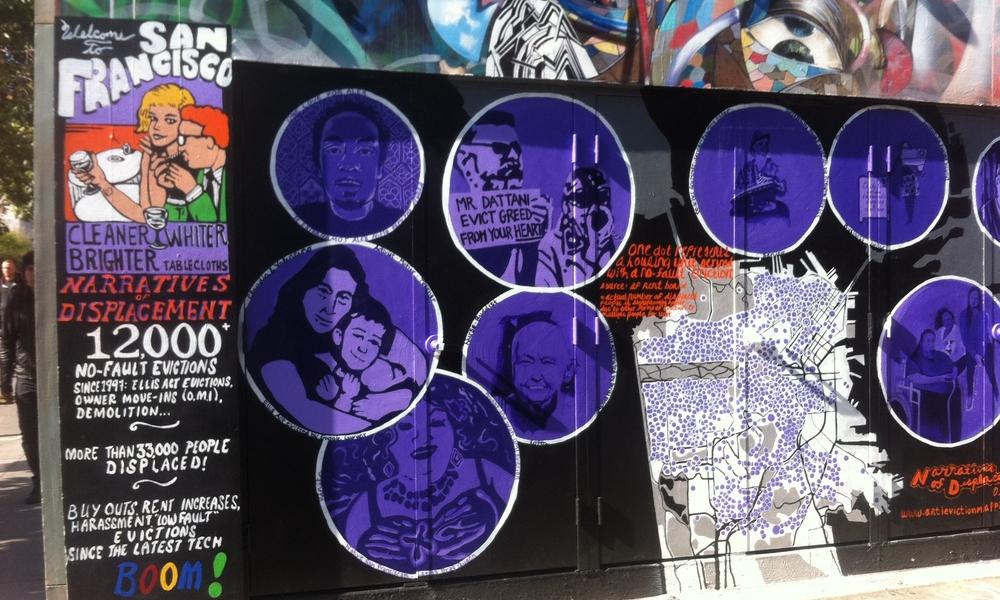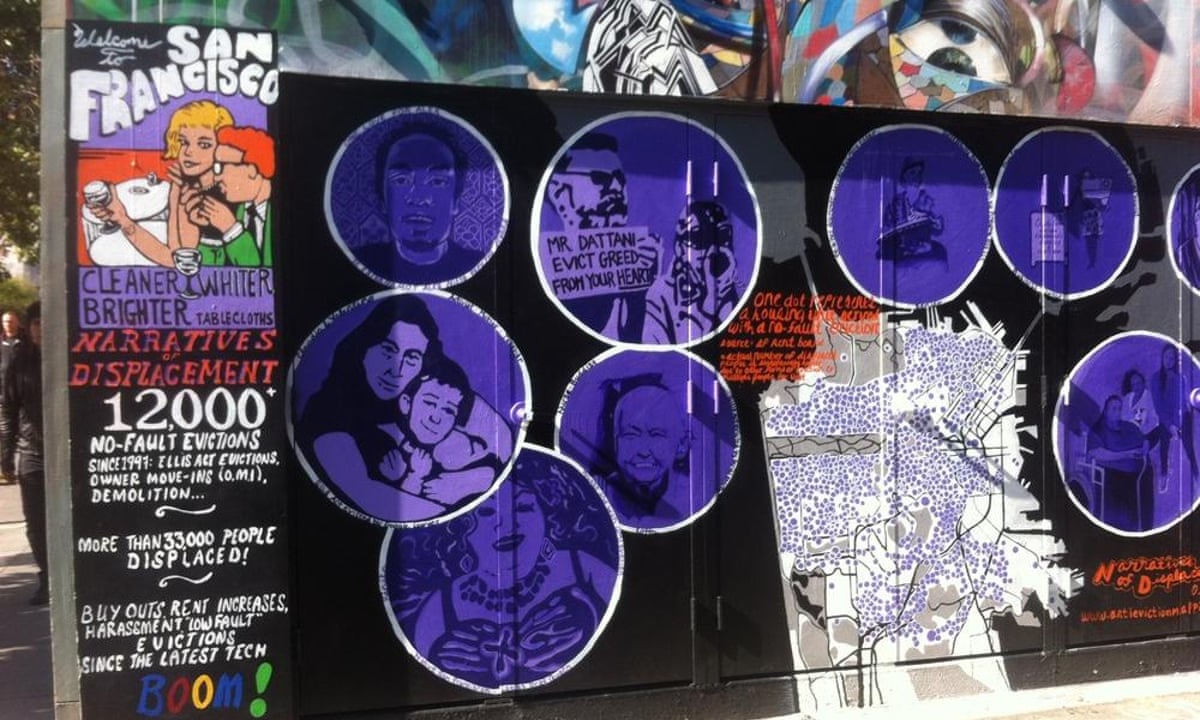Gentrification’s toll: ‘It’s you or the bottom line and sorry, it’s not you’
 Think of gentrification as a localized version of climate change: uprooting species and cultures, punishing the poor and rewarding the rich
Think of gentrification as a localized version of climate change: uprooting species and cultures, punishing the poor and rewarding the rich

Last week, the Sierra Club left San Francisco, its home since its founding 124 years ago. Like so many individuals and institutions, it was pushed out by high rent.
The Club, the USs largest grassroots environmental organization, will be fine in its new home across the bay in Oakland; its San Francisco I worry about.
Contemporary gentrification is an often violent process by which a complex and diverse urban environment becomes more homogeneous and exclusionary. It does to neighborhoods and cities what climate change is doing to the earth: driving out fragile and deeply rooted species, and pushing the poor past the brink.
Think of climate change as a globalized form of gentrification, reducing complex environments, uprooting species and cultures, punishing the poor and rewarding the rich or at least leaving them out of the purges. After all, the reason why climate change continues unabated long after most of the world has acknowledged its seriousness is that its profitable for some, notably fossil fuel companies, and not threatening enough to the people in power. You can buy your way out of a lot of trouble, if watching the suffering and annihilation of others doesnt trouble you.
Thanks to climate change, there is already immense suffering and loss, of places, species, crops, homes. The poor are often the people deeply rooted in place, whether theyre fisherfolk in the Mekong Delta (due to go underwater from rising seas) or farmers in desertifying Africa or India, where a horrific heatwave and drought killed at least 300 last month and left 330 million without enough water. The rich can always move on if their beachfront home floods or the weather in the Azores or Miami becomes unbearable, as it did last month in Cambodia during the most intense heatwave ever observed in south-east Asia, where the temperature reached 108.7F (42.6C) for the first time ever recorded.
Climate change produces famine, but the elite wont starve. Billionaire investment leader Warren Buffett wrote to his flock at Berkshire Hathaway that as a homeowner in a low-lying area, you may wish to consider moving. But when you are thinking only as a shareholder of a major insurer, climate change should not be on your list of worries.
This is what I thought about when I heard that the Sierra Club left San Francisco last week. Im sure youve heard that the boom in Silicon Valley has brought in hordes of well-paid tech workers, creating wildly escalating housing costs and scarcity and pushing out many longtime residents. Silicon Valleys well-paid workforce is disproportionately white, male and young. Schoolteachers, nurses, mechanics and other vital workers are being pushed out of an increasingly homogeneous central Bay Area, and homelessness is an escalating crisis.
Similar gentrification crises afflict cities around the world. For me, this matters because cities have been our brains trusts, our radical thinktanks, our revolutionary incubators. What will they be when no one can afford them unless theyre born rich or fall in line with the industries that provide sky-high salaries?
Its sad to be leaving a place thats been so important to the Sierra Club for such a long time, Michael Brune, the Sierra Clubs executive director since 2010, told me. The revolutionary spirit, people who lead lives that are wild and free: some of that seems to be leaving. It wouldve cost us between half and three quarters of a million [dollars] more to stay. Theres no way to justify spending that when we have a planet to save.
The club was founded with a mission to foster mountaineering expeditions and protect the Sierra Nevada mountains but morphed into a ferocious combatant over environmental issues around the country. Environmentalism itself has changed colossally in the past century, from putting fences around the nicest places to recognizing that you have to defend the whole system. Which the club does with vigor, playing a role at the Paris climate conference last December and at the protests surrounding it.
The Paris conference made clear what the conflict over climate change is really about. The poor nations, from the Philippines to Bolivia to Bangladesh, are fighting to protect life, for human beings and for the ecosystems they depend upon. Many in the wealthy countries are fighting to protect wealth, for the fossil fuel companies, investors and elites. Distilled down, the message from the global north is often something like, its you or our bottom line, and sorry, its not you.
Climate change will cost us all in the end, or at least will cost ordinary people in the wealthy countries. Trillions of dollars will be lost, but the burden will be borne as with wars and other avoidable wastes by ordinary people, the same people who will gain jobs and other benefits from a swift departure from fossil fuel.
My city is now an unbearable place. Most people who arent wealthy feel they have no future here, and those of us who are securely housed dread staying in place as the people we love get pushed out around us. The racial injustice that has included police murders of young men of color, most recently an indigenous man who had become homeless in 2012. It also includes widespread evictions, the loss of cultural institutions, and a sense of being pushed out, devalued, criminalized and threatened. A place long considered a utopia of sorts has become a textbook dystopia.
The week the Sierra Club left San Francisco, five people entered the second week of a hunger strike outside a police station to protest against killings they linked to racism and gentrification. The police station was on Valencia Street in the Mission district, on the same block where upscale men could get a $50 shave, across the street from where you could still get a $3 taco at El Toro, the old taqueria owned by the same people who own Pancho Villa. That week, a 25-year-old who had just moved to the city wrote in USA Today about all the apps you could use to get everything delivered by faceless minions and never have to go out and meet the neighbors, which was OK because you could also organize to meet like-minded people online. She wrote, I had burritos delivered from Pancho Villa twice before I ever stepped in the well-known staple in my Mexican-infused neighborhood.
The week the Sierra Club left the city where it had been founded and based for 124 years, the progressives on San Franciscos board of supervisors proposed to fine unregistered Airbnb listings, noting that 6,000 former residences had been converted to illegal hotels, contributing to the citys shrinking housing stock. That means that long-term residents, with histories, networks of relationships and commitments, are being replaced by transients who will never plant roots, know the neighbors or serve the community.
That week, the CEO of the Silicon Valley firm Invoca posted on Facebook to describe how he would punish the poor Latinos selling produce in his upscale neighborhood, If that was my house, I would go out there and make their life miserable. I would do whatever it took to make them leave. A lot of people were already miserable in this region afflicted by the runaway gentrification of a city in the grip of a boom.
The climate justice movement is a movement to keep the whole Earth for all of us. Its a movement to recognize that we depend on the health of the non-human world, and that we are all in this together. The Sierra Clubs departure from San Francisco reminds us that loss of diversity impoverishes environments, and that what we too often call wealth enriches a few but impoverishes many when it drives out species, communities, cultural continuities, idealism and altruism.